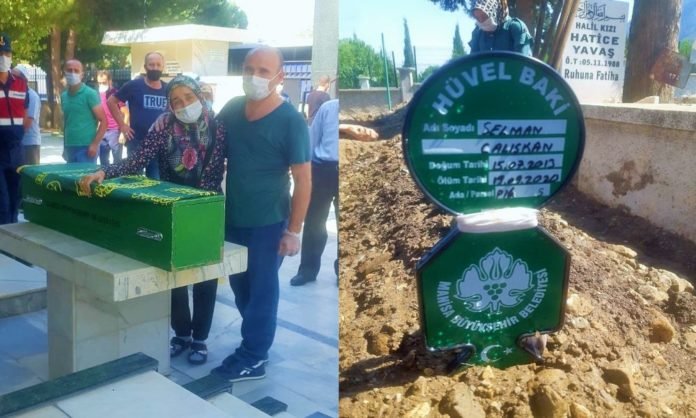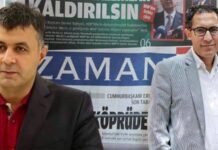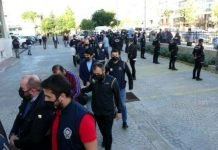Seven-year-old Selman Çalışkan succumbed to brain cancer on Saturday without being able to see his father, a teacher jailed on bogus terrorism charges, one last time.
Selman was diagnosed with brain cancer a year ago. He underwent surgery in June 2019 to remove a five-centimeter tumor and was partially paralyzed after the operation. His father, Rasim Çalışkan, was only allowed to visit his son twice during his illness, once following the surgery and once last month when Selman’s condition deteriorated. Selman always thought his father was away due to his job. Çalışkan filed numerous requests to delay his sentence or to serve the remainder under house arrest, but his petitions were all rejected.
Beyin kanseri Selman Çalışkan’son günlerini yaşıyor Bu sabah kan kusmuş 😭😭😭😭
Anne Emine Çalışkan:
“Selmanım babasını istiyor. Artık zamanı kalmadı. Daha neyi bekliyorsunuz. Son bir kez sarılmasın mı?” @adalet_bakanlik pic.twitter.com/OcbSgIXlgA
— Arlet Natali AVAZYAN (@NataliAVAZYAN) August 9, 2020
Human rights defender Natali Avazyan’s successful plea to authorities last month to allow Rasim Çalışkan to visit his son for a couple of hours.
Çalışkan is a literature teacher who was summarily dismissed from his job at a public high school in the aftermath of a July 15, 2016 coup attempt in Turkey. He was later arrested, on May 17, 2017, and sentenced to seven years, six months’ imprisonment for “membership in an armed terrorist organization.” He is accused of being a member of the Gülen movement.
The Turkish government accuses the Gülen movement, a faith-based group inspired by Turkish cleric Fethullah Gülen, of masterminding the July 2016 coup attempt and labels it a terrorist organization. The movement strongly denies involvement in the coup attempt or any terrorist activity.
In a letter to Ömer Faruk Gergerlioğlu, a human rights defender and deputy for the pro-Kurdish Peoples’ Democratic Party (HDP), Çalışkan had said his wife can no longer bear it. “For how long can a mother who has to take care of three children, one of them seriously ill, with no financial means, taking medication herself for cardiac and psychological problems, withstand these difficulties?” he had said.
Maalesef az evvel kaybettik!
KHKlı Rasim Çalışkan'ın beyin kanseri olan oğlu 6 yaş Selman Çalışkan ruhunu teslim etti
Rasim bey onlarca defa tahliye talep eden dilekçeler vermişti, kabul edilmedi!!!
Annesi bu süreçte eşi olmadan çocuğunu hastanelerde takip etti
Büyük bir acı pic.twitter.com/DeIuJkvLvk
— Ömer Faruk Gergerlioğlu (@gergerliogluof) September 19, 2020
Gergerlioğlu announced Selman’s death in a tweet: “Unfortunately we lost [him] moments ago. … Rasim [Selman’s father] had officially applied for his release several times but his requests were not approved!!! … A great tragedy.”
Çalışkan had also talked about how difficult it was for his wife to take their son to the hospital for treatment, saying: “We don’t have a car, and my wife can’t drive. She has been asking our friends and neighbors to take them to the hospital. The current treatment will continue for two years. How can we continue like this?”
Selman was traveling from the western city of Manisa to the neighboring city of Izmir for all his treatments. Yet, the tumor kept growing despite the surgery and various treatments. They had started a new type of chemotherapy using drugs imported from Cuba, which was expected to last for two years, but after a while doctors said it did not work, either.
Little Selman’s case is reminiscent of the story of Ahmet Burhan Ataç, an 8-year-old boy who passed away in May after not being able to receive proper and timely treatment abroad as the Turkish authorities refused to issue his mother, who was under a travel ban, a passport. When they at last agreed after intense public pressure, it proved to be too late for the treatment. Ahmet was not even able to see his father, Harun Reha Ataç, who was similarly in prison on trumped-up terrorism charges, one last time. Ataç had worked at a student hostel that the Turkish government claims to have had ties with the Gülen movement.
Following the coup attempt, the Turkish government declared a state of emergency and launched a massive crackdown on followers of the Gülen movement under the pretext of an anti-coup fight. Over 540,000 people were detained on terrorism-related charges, more than 80,000 were arrested or imprisoned and over 150,000 public servants, including 4,145 judges and prosecutors, were summarily removed from their jobs for alleged membership in or relationships with “terrorist organizations.”
Barred from government positions, people who were summarily fired or prosecuted in the aftermath of the abortive putsch are not even able to find employment under formal contracts in the private sector. The authorities posted notices on the social security database about dismissed public servants, and companies are afraid to hire them for fear of government reprisal. The Turkish government also refuses to issue passports to the “purged,” sparking criticism that they have been subjected to a civilian death.
















